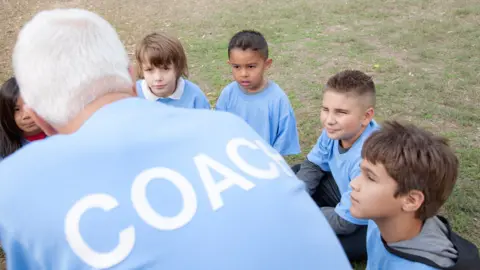Sport Wales: Fewer pupils in deprived areas doing sport
 fstop123/Getty Images
fstop123/Getty ImagesThere is "a lot of work to be done" to close the gap in sports participation for some pupils, a Sport Wales report has shown.
The School Sport Survey showed the gap between children from the most and least deprived areas taking part in sport widened in the past three years.
But it found more children with a disability or from certain ethnic minority groups do sport regularly.
Sport Wales is to work on improvements over the next 18 months.
About 120,000 children, aged seven to 16, and teachers from schools across Wales took part in the research looking at sports participation, health and well-being.
It found:
- Children taking part in sport outside school three or more times a week remains unchanged since 2015 at 48%
- A gender disparity between boys and girls remains
- Those from the most deprived areas taking part in sports three or more times a week has fallen to 42%, down from 43% in 2015
- The difference in participation rates between the most and least deprived children has increased to 13%
- 40% of Asian British pupils, traditionally the lowest participating ethic group, said they were taking part in sport regularly
- The rise is bigger for pupils with a disability or impairment, with 45% saying they are involved in regular sports activity
'A great way to make friends'
Dhiya, 13, from Cardiff, said: "It's about making a new friends and being with everyone and having fun. I play basketball inside school - and out.
"When I first came to this rugby club I attend, there weren't many people there, and my teacher said it must be because they're on their phones nowadays. But sport's a great way of making friends rather than just being online."
Amelia, 12, added: "I just think you should give it a go and you don't know until you try."
Jess, 12, enjoys swimming the most: "I also enjoy girls' rugby but it's been stereotyped as a boys' sport. But it's really nice to learn it and discover it's not just for boys."

Sport Wales said it would work with local authorities and sport governing bodies over the next 18 months to understand the reasons behind the fall.
Owen Hathway, the head of insight and policy at Sport Wales, said: "It's really encouraging to see the rise in numbers."
He said a lot of work had been done by Disability Sport Wales and BME Sport Cymru to engage specific groups of young people.
There are also examples of sports, such as cricket, working with ambassadors from ethnic minority communities, allowing them to adapt to suit different religions by offering different times.
"There is however, still a lot of work to be done. There are still groups where the gap is not closing," he added.
While overall participation levels have remained stable since the last survey, enjoyment of sport both in and out of school has fallen.
Chief executive of Sport Wales Sarah Powell said: "Without it, there is no hope of them having a positive lifelong relationship with sport."
The survey found that on average 99 minutes per week were allocated to PE in schools in Wales - below the two-hour Welsh Government recommendation - although 96% of the children surveyed said they wanted to do more sport.
Ms Powell added she would work with schools including looking at introducing less traditional sports into the curriculum.
